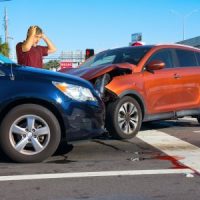Crashes at Intersections

Many people enjoy driving and teens look forward to the day when they get their driver’s license, but the truth is that driving is not easy. Crashes are common, especially at intersections.
That’s because these are the locations where two or more roads cross each other. Activities such as turning left, turning right, and crossing over have the potential for conflicts.
Reports from the National Highway Traffic Safety Administration (NHTSA) estimate that 36% of all motor vehicle crashes happen at intersections. These accidents usually happen when cars come into conflict with each other.
Interestingly, reasons for intersection crashes may vary based on age or gender. For both male and female drivers over the age of 55, crashes may be attributed to misjudgment of gap or speed of other vehicles. Male drivers of all ages are likely to be involved in intersection-related crashes due to illegal maneuvers, driving aggressively, or going too fast for conditions.
Reasons for Intersection Crashes
Accidents at intersections can occur in a number of ways:
- Failure to yield the right of way. This is one of the most common causes of intersection accidents. Crashes occur because drivers fail to yield the right of way, whether due to distraction, impatience, or misunderstanding of traffic rules.
- High traffic volume. Intersections are points where different streams of traffic converge, increasing the likelihood of accidents due to the sheer number of vehicles passing through.
- Intersections often involve multiple lanes, traffic lights, stop signs, pedestrians, cyclists, and turning lanes, making them more complex environments where drivers must pay close attention to a lot of factors simultaneously.
- Left turns. Left turns at intersections are particularly risky, as drivers must often cross oncoming traffic. Misjudging the speed or distance of approaching vehicles can lead to collisions.
- Red light running. Some drivers may disregard traffic signals and run red lights, leading to dangerous T-bone collisions.
- Distracted driving. With the prevalence of smartphones and other distractions, drivers may not pay sufficient attention to traffic signals, other vehicles, or pedestrians while navigating intersections.
- Once you establish a routine such as taking the same route to school or work each day, there is an increased risk of inattention. You may not pay as much attention to the roads as you did in the past. This may be attributed to the increase in technology in vehicles or routine laziness.
- Poor visibility. Factors such as poor weather conditions, obstructions like buildings or trees, or poorly designed intersections can reduce visibility, making it harder for drivers to anticipate and react to potential hazards.
- Driving under the influence. Intoxicated drivers are more likely to make errors in judgment and reaction time, increasing the risk of accidents at intersections. Even if you are sober, another driver may be driving while under the influence.
Contact a Personal Injury Lawyer
Intersections can be dangerous. Drivers may not yield the right of way. Bicycles and pedestrians may complicate things.
It’s best to play it safe at intersections. Drive carefully but know what if you do get into a crash, a Houston car accident attorney from The West Law Office, PLLC can help you get compensation for damages. To schedule a free consultation, fill out the online form or call 281-347-3247.
Source:
crashstats.nhtsa.dot.gov/Api/Public/ViewPublication/811366
